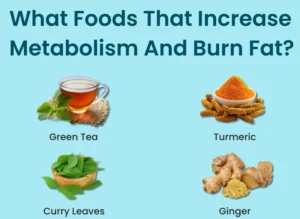How to Increase Metabolism For Weight Loss Naturally
Have you ever questioned why some individuals eat everything they want and never seem to gain weight, while others find it difficult to eat every meal? Often, metabolism is the key.
Your body uses metabolism to turn the food and liquids you consume into energy. Your body needs energy to do things like breathe, circulate blood, and repair cells, even when you’re not moving. Losing weight may be facilitated by your body burning calories more effectively if your metabolism is greater.
What Role Does Metabolism Play in Weight Loss?
We lose weight when we consume less calories than we require. There are, however, additional aspects that are involved. For instance, each person has a different metabolism. Weight management can be easier for some people because they naturally have quicker metabolisms, but it can be quite difficult for others.
Comprehending your body’s metabolism facilitates weight loss through informed decision-making.
The following variables affect metabolism and weight loss:
- Age: As we age, our metabolism slows down. One explanation for why weight loss may become more challenging as we age.
- Sex: Generally speaking, men have a faster metabolism than women. Men just have larger muscular mass than women; there is no evolutionary bias.
- Muscle mass: Even while at rest, muscle burns more calories than fat. Your metabolism will be higher if you have more muscle.
- Exercise level: Your metabolism is influenced by physical exercise.
- Genetics: Some people are predisposed to have a quicker metabolism from birth. God bless you! They could burn calories naturally more effectively and discover that it’s simpler to keep a healthy weight.
Strategies to Increase Metabolism and Reduce Weight
- Eat plenty of protein at every meal
- Do a high-intensity workout
- Lift heavy things
- Stand up more
- Drink green tea or oolong tea
- Eat spicy foods
- Get a good night’s sleep
- Drink coffee
- Drink enough water
Eat plenty of protein at every meal: For a few hours, eating can cause your metabolism to rise.
We refer to this as the thermic effect of food (TEF). The additional calories needed to break down, absorb, and assimilate the nutrients in your food are the reason.
TEF rises more when protein is present. As opposed to 5–10% for carbohydrates and 0-3% for fats, 20–30% of dietary protein’s useable energy must be used for metabolism.
Increasing protein intake can help lessen the metabolic decline that is frequently linked to fat loss. This is because a common consequence of dieting is muscle loss, which protein helps to avoid.
Do a high-intensity workout: Rapid bursts of intensive activity are a component of high-intensity interval training (HIIT).
You can indirectly increase your metabolism by engaging in this kind of workout if it’s safe for you. In order to burn fat and gain muscle, your muscle cells will use energy when they are at rest.
For HIIT, this effect is thought to be stronger than for other forms of exercise.
Lift heavy things: Compared to fat, muscle has a higher metabolic activity. Gaining muscle can help you burn more calories every day, even when you’re not moving.
Additionally, lifting weights can help you maintain your muscle mass and prevent the metabolism from dropping while you lose weight.
Stand up more: Long periods of sitting can increase weight gain and reduce calorie expenditure, which are two reasons why excessive sitting can be harmful to your health.
Standing or stepping at work was linked to decreased cardiometabolic risk (CMR) scores, weight, body fat, waist circumference, systolic and diastolic blood pressure, fasting triglycerides, total/HDL cholesterol, and insulin, according to a 2018 review.
Nevertheless, stepping led to more significant reductions in systolic blood pressure and insulin resistance than standing.
To break up the amount of time you spend sitting down if you work a desk job, try getting up and moving around for little periods of time. Another option is to purchase a standing desk or go for walks during the day. In a 2020 study, scientists discovered that doing this led to lower blood sugar and insulin levels.
Drink green tea or oolong tea: Combining green and oolong teas with exercise may indirectly enhance fat burning by converting some of the body’s stored fat into free fatty acids.
It is believed that the teas’ effects on your gut microbiota, which enhances how your body breaks down fats for energy and turns extra energy into fat for later use, may help prevent a weight loss plateau in an indirect way.
But according to several earlier studies, these teas have little effect on metabolism. They may therefore have a minor impact or just affect a select few.
Eat spicy foods: Capsaicin, which is found in peppers, is a substance that can increase metabolism.
But a lot of folks can’t handle these spices at the levels needed to make a big difference.
One review from 2016 examined the effects of capsaicin at reasonable dosages, for example. It was estimated that consuming peppers will increase caloric expenditure by about 10 calories each meal. This might explain 1 pound (lb) or 0.5 kilogrammes (kg) of weight loss over 6.5 years for a male of average weight.
Get a good night’s sleep: Obesity risk is significantly increased when sleep deprivation occurs.
Leptin, a hormone that regulates fullness (satiety), and ghrelin, the hunger hormone, have also been demonstrated to be impacted.
This could be the cause of the frequent hunger pangs and weight loss or increase experienced by many sleep-deprived people.
In a 2019 study, researchers also discovered that sleep deprivation lasting four nights or more may marginally impair the body’s ability to metabolise fat. This rise is minor, though, and can be readily reversed with a restful night’s sleep.
Drink coffee: According to research, coffee can cause the body to produce neurotransmitters like epinephrine, which assist control how your body breaks down fat.
However, a number of variables may cause this effect to change. Caffeine, for example, was found to be more effective than skilled athletes at increasing fat burning during exercise in people who lead less active (sedentary) lifestyles.
Drink enough water: Water is essential for a healthy metabolism and can aid in weight loss.
Summary
- Although altering one’s metabolic rate is not always feasible, food and exercise modifications may be beneficial.
- Having a greater metabolic rate could aid in controlling weight. But it’s better to concentrate on eating a diversified diet full of nutritious foods and getting regular exercise if you’re trying to reduce weight. Spices and other foods may help increase rates in the short term, but they are not a permanent fix.
- In 2016, 13 individuals who drank 250 or 500 millilitres (mL) of water had their metabolic rates measured. After 500 mL when at rest, they discovered evidence of increased fat oxidation, leading them to infer that drinking water may have an impact on metabolism. They did not discover, though, that it raised metabolic rate.
FAQ’s
What is metabolic rate?
The rate at which the body burns calories and consumes energy is referred to as the metabolic rate. The term resting metabolic rate (RMR), commonly referred to as resting energy expenditure (REE), describes how much energy the body uses when it is at rest, such as when sleeping or sitting. This is how the majority of the body’s energy is used.
What is a high metabolic rate?
Individual differences in metabolic rates make it impossible to define a high or normal metabolic rate. But the higher the rate, the faster an individual will burn the energy they consume from food, potentially lowering the chance of gaining weight.
Which foods speed up your metabolism?
Protein-rich foods like meat, dairy, and legumes are usually foods that increase your metabolism. Although a few other particular meals may also be helpful, your total dietary plan and calorie requirements are more important. The top 12 foods that increase your metabolism are discussed in further detail.
Nuts, turkey, or fish are examples of protein-rich snacks that can increase fat burning if you eat them right before bed. Learn more about these and other pre-bedtime snacks.
What can increase metabolic rate?
Eating the right amount of calories, choosing protein over fat and carbs, getting enough sleep, and engaging in strength training and other forms of exercise are all factors that can raise a person’s metabolic rate.
References:
- Rd, H. W. (2024, January 11). 8 ways that may speed up your metabolism. Healthline. https://www.healthline.com/nutrition/10-ways-to-boost-metabolism#eat-protein
- Crna, R. N. M. (2024, May 15). How to increase your metabolism. https://www.medicalnewstoday.com/articles/323328
- How to increase metabolism for weight loss | Aashirvaad. (n.d.). https://aashirvaad.com/blogs/understanding-metabolism-and-its-role-in-weight-loss-how-to-increase-metabolism.html







